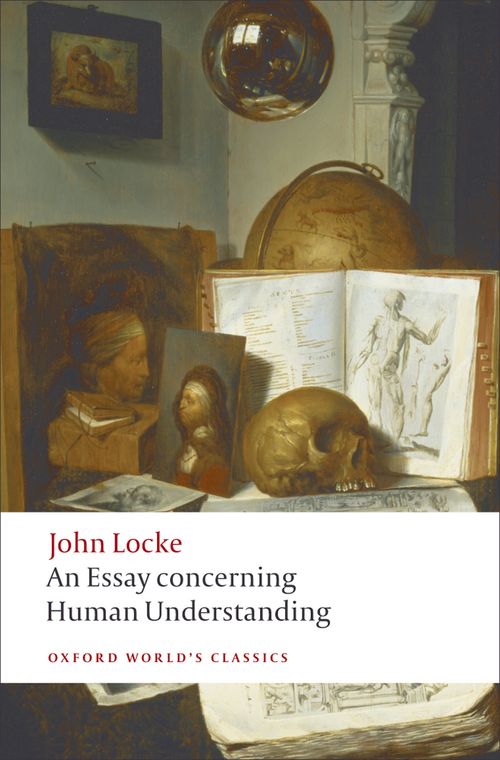Home >
Oxford World's Classics >
An Essay Concerning Human Understanding (Philosophy, Politics, History, Science, and Economics)
Oxford World's Classics: Philosophy, Politics, History, Science, and Economics | Philosophy, Politics, History, Science, and Economics
An Essay Concerning Human Understanding
ISBN: 9780199296620
Series: Oxford World's Classics: 哲学・政治・歴史・科学・経済
An Essay Concerning Human Understanding (Philosophy, Politics, History, Science, and Economics)
Oxford World's Classics: 哲学・政治・歴史・科学・経済 An Essay Concerning Human Understanding (Philosophy, Politics, History, Science, and Economics) メディア > 書籍 > ノンフィクション > 言語学習書 Expect Delays of Up to 4 Weeks| ご注文はこちら |
ISBN
9780199296620 (旧規格ISBN: 0199296626)
- 説明
- シリーズの説明
作家名:ロック
放題:人間悟性論
'I must apply my self to Experience; as far as that reaches, I may have certain Knowledge, but no farther.' In An Essay concerning Human Understanding, John Locke sets out his theory of knowledge and how we acquire it. Eschewing doctrines of innate principles and ideas, Locke shows how all our ideas, even the most abstract and complex, are grounded in human experience and attained by sensation of external things or reflection upon our own mental activities. A thorough examination of the communication of ideas through language and the conventions of taking words as signs of ideas paves the way for his penetrating critique of the limitations of ideas and the extent of our knowledge of ourselves, the world, God, and morals. Locke's masterpiece laid the foundation of British empiricism and is of enduring interest to anyone exploring the development of philosophical thought. This sensitive abridgement uses P. H. Nidditch's authoritative text, and together with an illuminating introduction and other features, makes Locke's arguments more accessible.
放題:人間悟性論
'I must apply my self to Experience; as far as that reaches, I may have certain Knowledge, but no farther.' In An Essay concerning Human Understanding, John Locke sets out his theory of knowledge and how we acquire it. Eschewing doctrines of innate principles and ideas, Locke shows how all our ideas, even the most abstract and complex, are grounded in human experience and attained by sensation of external things or reflection upon our own mental activities. A thorough examination of the communication of ideas through language and the conventions of taking words as signs of ideas paves the way for his penetrating critique of the limitations of ideas and the extent of our knowledge of ourselves, the world, God, and morals. Locke's masterpiece laid the foundation of British empiricism and is of enduring interest to anyone exploring the development of philosophical thought. This sensitive abridgement uses P. H. Nidditch's authoritative text, and together with an illuminating introduction and other features, makes Locke's arguments more accessible.
Oxford World’s Classics は、誰もが知る有名な物語から一般読者にはなじみの薄い隠れた名作まで、古典や文芸作品の数々を100年以上に渡り提供し続けているオックスフォード大学出版局を代表する叢書です。 現在メソポタミア神話から20世紀小説の名著まで、約770タイトルを刊行しており、各作品に相応しい専門家を校訂者に迎え、原典に解題、注釈、年代記、関係書目を付して紹介しています。必要に応じ、地図や用語集、索引、図版等の付録をつけているほか、読者に最新の研究動向を踏まえた作品理解を促すべく、定期的な新刊の追加や、既刊タイトルの改版を行っています。
(注意:本書は、原文を掲載した書籍です。グレイデッド・リーダーではありません)
作家名:ロック
放題:人間悟性論
'I must apply my self to Experience; as far as that reaches, I may have certain Knowledge, but no farther.' In An Essay concerning Human Understanding, John Locke sets out his theory of knowledge and how we acquire it. Eschewing doctrines of innate principles and ideas, Locke shows how all our ideas, even the most abstract and complex, are grounded in human experience and attained by sensation of external things or reflection upon our own mental activities. A thorough examination of the communication of ideas through language and the conventions of taking words as signs of ideas paves the way for his penetrating critique of the limitations of ideas and the extent of our knowledge of ourselves, the world, God, and morals. Locke's masterpiece laid the foundation of British empiricism and is of enduring interest to anyone exploring the development of philosophical thought. This sensitive abridgement uses P. H. Nidditch's authoritative text, and together with an illuminating introduction and other features, makes Locke's arguments more accessible.
放題:人間悟性論
'I must apply my self to Experience; as far as that reaches, I may have certain Knowledge, but no farther.' In An Essay concerning Human Understanding, John Locke sets out his theory of knowledge and how we acquire it. Eschewing doctrines of innate principles and ideas, Locke shows how all our ideas, even the most abstract and complex, are grounded in human experience and attained by sensation of external things or reflection upon our own mental activities. A thorough examination of the communication of ideas through language and the conventions of taking words as signs of ideas paves the way for his penetrating critique of the limitations of ideas and the extent of our knowledge of ourselves, the world, God, and morals. Locke's masterpiece laid the foundation of British empiricism and is of enduring interest to anyone exploring the development of philosophical thought. This sensitive abridgement uses P. H. Nidditch's authoritative text, and together with an illuminating introduction and other features, makes Locke's arguments more accessible.
シリーズの説明
Oxford World’s Classics は、誰もが知る有名な物語から一般読者にはなじみの薄い隠れた名作まで、古典や文芸作品の数々を100年以上に渡り提供し続けているオックスフォード大学出版局を代表する叢書です。 現在メソポタミア神話から20世紀小説の名著まで、約770タイトルを刊行しており、各作品に相応しい専門家を校訂者に迎え、原典に解題、注釈、年代記、関係書目を付して紹介しています。必要に応じ、地図や用語集、索引、図版等の付録をつけているほか、読者に最新の研究動向を踏まえた作品理解を促すべく、定期的な新刊の追加や、既刊タイトルの改版を行っています。
(注意:本書は、原文を掲載した書籍です。グレイデッド・リーダーではありません)
ご注意:
Audio Guide available online
EASY ORDER FORM
表示価格が税込価格
価格(税抜):
3,270 円


